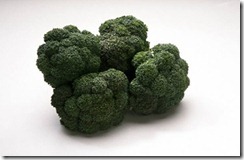January’s food of the month is: broccoli!
 Despite the controversy on whether it is a tasty food or not, one thing is certain: it is considered one of the best superfoods in the world. In other words, it is an ingredient in cooking that is saturated with vitamins and minerals necessary for positive physical and mental health.
Despite the controversy on whether it is a tasty food or not, one thing is certain: it is considered one of the best superfoods in the world. In other words, it is an ingredient in cooking that is saturated with vitamins and minerals necessary for positive physical and mental health.
Recently, there has been much more awareness about the serious effects of a vitamin D deficiency, one of which is depression. While broccoli is not a source of vitamin D, it is very high in beta-carotene and K. Research has concluded that a diet high in beta-carotene and vitamin K can help maintain vitamin D metabolism, which is especially important if you are taking supplements to increase your vitamin D levels. Beta-Carotene also protects against declining memory and thought processes as well as learning skills that often precede Alzheimer's disease.
Among all of the cruciferous vegetable, such as kale, arugula and cabbage, broccoli has the highest concentration of vitamin C. This vitamin is necessary to repair the adrenal glands after experiences of acute and chronic stress. In addition, vitamin C helps create a neurotransmitter called norepinephrine which helps us feel alert and energetic. It also helps improve concentration and focus.
Symptoms of a norepinephrine deficiency include fatigue, low mood, cloudy thoughts, low concentration and poor memory. If you find yourself consistently experiencing these symptoms, forego the caffeine and instead eat foods high in vitamin C, such as broccoli.
Broccoli is also high in B-vitamins, especially folate (or folic acid). Low levels of folate have been connected to increasing symptoms of depression; therefore, a diet high in folate have shown to protect against depressive symptoms and low mood.
Diets low in iron are also correlated with low mood and depression. Broccoli is a good source of iron and eating it at least twice a week can buffer against depressive symptoms such as weakness, exhaustion, loss of appetite and headaches.
Broccoli is also a good source of magnesium which is equally important for mental and emotional issues. A magnesium deficiency most often results in fatigue, moodiness, anxiety and insomnia.
In addition, it also has high levels of manganese which has positive effects on mood disorders such as depression. People who experience low mood, chronic fatigue or even fibromyalgia are encouraged to eat a diet rich in manganese.
Among all of the strong qualities broccoli has to maintain physical health, it is also a superfood because it protects against many emotional health issues such as anxiety, depression, and maintaining a strong memory.
Treat your body well this year and be sure to eat broccoli at least 2-3 times a week. We hope you enjoy some of the broccoli recipes featured on this website for some creative ways to cook this amazingly healthy ingredient.
Broccoli Soup with Cheese Toast (see recipe)
Spicy Roasted Broccoli (see recipe)
We would love to hear your response to this article! Please feel free to leave a comment. (Comments can be left anonymously if you type “anonymous” or just your initials into the name box).
